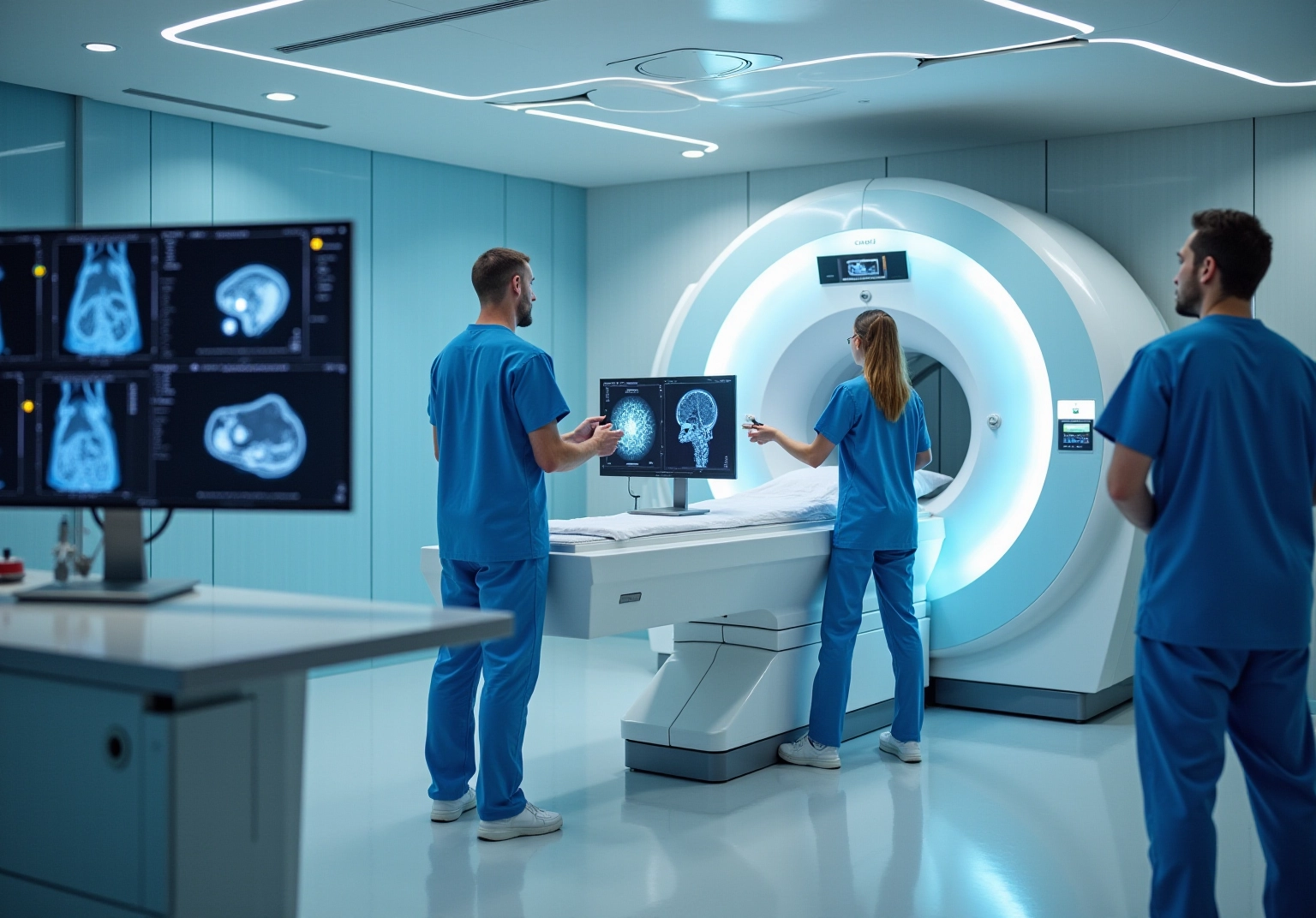
The article ‘9 Types of AI in Healthcare Transforming Patient Care’ emphasizes the transformative impact of various artificial intelligence technologies on patient care across diverse healthcare sectors. It outlines specific applications, such as IBM Watson’s data analysis, which enhances diagnostic accuracy, and Aidoc’s rapid image analysis in radiology, illustrating that AI not only boosts operational efficiency but also empowers medical professionals to deliver more timely and effective care. By integrating these advanced technologies, healthcare providers can significantly improve patient outcomes and streamline their operations, ultimately revolutionizing the healthcare landscape.
The integration of artificial intelligence in healthcare transcends mere trend; it stands as a transformative force that is reshaping patient care and clinical practices. With the emergence of various AI technologies, there lies a promise to enhance diagnostic accuracy, streamline workflows, and improve patient engagement, ultimately leading to superior health outcomes.
However, these advancements introduce significant challenges, including data privacy concerns and the necessity for continuous training among healthcare professionals.
How can the healthcare industry effectively balance the substantial benefits of AI with these pressing issues, all while ensuring that patient care remains the paramount priority?
The Inferscience HCC Assistant addresses a critical challenge in the healthcare sector: the complexity of HCC coding procedures. This cutting-edge tool significantly enhances the precision and efficiency of medical providers by automating the gathering and examination of clinical data. As a result, the HCC Assistant offers real-time coding recommendations precisely when treatment occurs, alleviating the administrative burden on medical staff. Consequently, providers can optimize their Risk Adjustment Factor (RAF) scores, leading to improved funding from Medicare Advantage contracts.
Furthermore, the seamless integration of this tool within electronic health records (EHRs) creates a streamlined workflow. This allows medical professionals to focus more on delivering quality care while ensuring compliance with coding regulations. By adopting the HCC Assistant, healthcare organizations not only enhance operational efficiency but also position themselves for better financial outcomes in an increasingly complex reimbursement landscape.

In the rapidly evolving landscape of healthcare, the challenge of managing extensive volumes of medical data is paramount. IBM Watson Health leverages artificial intelligence to address this issue, providing actionable insights that significantly enhance patient outcomes. By integrating AI into clinical workflows, IBM Watson empowers medical providers to make informed decisions grounded in real-time data analysis. This transformative capability not only improves diagnostic accuracy but also streamlines treatment strategies, ensuring individuals receive timely and effective care.
The AI-driven insights generated by IBM Watson are vital for identifying potential health risks and optimizing resource allocation, ultimately leading to better management of patients and enhanced delivery of medical services. Furthermore, Inferscience’s HCC Assistant complements these AI systems by automating the collection and analysis of clinical data, thereby improving coding accuracy at the point of service. This integration alleviates administrative burdens, allowing medical providers to focus more on delivering quality care while maximizing funding from Medicare Advantage contracts.
Notably, prestigious organizations such as the Mayo Clinic have successfully utilized IBM Watson to refine participant selection for clinical trials, exemplifying the system’s potential to revolutionize care and operational efficiency within medical environments. However, it is crucial to recognize the challenges and limitations associated with AI in healthcare settings, including concerns surrounding data privacy and the necessity for continuous training and support for medical personnel to effectively harness these advanced technologies.

Google Health is revolutionizing the healthcare landscape through the strategic application of various types of AI in healthcare, significantly enhancing diagnostics and user engagement. By leveraging advanced machine learning algorithms, Google Health’s AI systems demonstrate different types of AI in healthcare as they adeptly analyze medical images and individual data, delivering precise diagnostic support.
In 2024, a remarkable 66% of physicians reported incorporating AI into their practices, showcasing a notable increase from 62% in the previous year. Moreover, the types of AI in healthcare, including AI-driven tools, substantially boost user engagement by offering tailored health insights and recommendations. This empowers individuals to take charge of their well-being while fostering a collaborative relationship between patients and healthcare providers, ultimately leading to improved health outcomes.
Impressively, 68% of surveyed physicians recognized the advantages of types of AI in healthcare for improving patient care, reflecting a 5 percentage point rise from 2023. Additionally, case studies, such as the performance of Google’s AMIE in interpreting multimodal data, underscore the tangible effectiveness of various types of AI in healthcare in enhancing diagnostic accuracy.
While the integration of types of AI in healthcare presents numerous benefits, it is essential to address concerns regarding privacy risks and integration challenges, ensuring a balanced perspective on the evolving role of AI in the medical field.

Epic Systems stands at the forefront of leveraging various types of AI in healthcare to enhance clinical workflows, significantly boosting medical delivery efficiency. By integrating various types of AI in healthcare into its electronic health record (EHR) systems, Epic empowers medical providers to automate routine tasks, which has been shown to decrease documentation errors by as much as 20%. This integration not only simplifies data management for individuals but also allows clinicians to dedicate more time to their patients, ultimately leading to improved outcomes. For instance, medical organizations utilizing Epic’s AI solutions have reported a 15% increase in service efficiency, demonstrating the tangible benefits of types of AI in healthcare for enhancing clinical workflows.
Moreover, Inferscience’s HCC Assistant complements these advancements by automating the collection and analysis of clinical data, thereby alleviating administrative burdens and improving coding accuracy. Epic’s commitment to the types of AI in healthcare illustrates how technology can transform medical operations and enrich the overall experience for patients. As noted by a representative from Inferscience, “By utilizing our HCC Assistant, we have observed considerable enhancements in coding precision and efficiency, enabling providers to focus more on patient care.”
Nevertheless, challenges such as transparency and data privacy concerns persist as critical barriers to the broader adoption of AI in medical settings.
Aidoc stands at the forefront of integrating artificial intelligence into radiology, delivering AI-powered image analysis that accelerates the diagnostic process. By harnessing advanced algorithms, Aidoc’s system swiftly analyzes medical images, flagging critical findings for radiologists to review. This capability not only enhances diagnostic precision but also reduces the time required for image analysis, enabling healthcare providers to deliver prompt care to patients. Notably, Aidoc’s clinical AI solutions encompass 75% of individuals within health systems, underscoring the extensive reach of their technology.
The implementation of Aidoc’s solutions has resulted in a significant decrease in door-to-puncture time for patients experiencing strokes, saving an average of 38 minutes. These advancements underscore the transformative potential of types of AI in healthcare to refine radiology workflows, ultimately improving outcomes for patients and operational efficiency across medical systems. As Giles Bruce aptly noted, “Artificial Intelligence is actively shaping the future of healthcare, and the speed of innovation is accelerating every day.”
For CFOs, leveraging AI solutions such as Aidoc’s can yield substantial operational efficiencies and enhanced patient care, presenting a compelling case for investment in these innovations.

Zebra Medical Vision addresses a critical challenge in healthcare: the timely detection of diseases. By harnessing the power of artificial intelligence, the company facilitates early disease detection through advanced medical imaging analysis, showcasing different types of AI in healthcare. Utilizing sophisticated machine learning algorithms, Zebra’s technology identifies potential health issues in imaging data that may be overlooked by human eyes. This capability empowers medical providers to detect diseases at earlier stages, significantly enhancing the likelihood of successful treatment and improved patient outcomes.
Research findings underscore the effectiveness of machine learning models, achieving up to 99% accuracy in diagnosing conditions such as COVID-19 from CT images. This statistic highlights the transformative potential of types of AI in healthcare for modern diagnostic practices. Furthermore, Zebra’s commitment to enhancing diagnostic precision is evidenced by its implementation in 150 hospitals and medical organizations across 20 developing nations, demonstrating a strong dedication to improving access and outcomes in healthcare worldwide.
However, it is essential to acknowledge the challenges associated with integrating AI into medical institutions, which can hinder the widespread adoption of these innovative advancements. Overall, Zebra Medical Vision’s initiatives emphasize the vital role of innovation in contemporary healthcare, showcasing various types of AI in healthcare, positioning the company as a leader in the field and paving the way for a future where early disease detection is the norm.

PathAI is revolutionizing cancer diagnostics by harnessing the power of artificial intelligence technology. By employing advanced AI algorithms to analyze pathology images, PathAI enhances the accuracy and efficiency of cancer detection significantly. This innovative approach assists pathologists in identifying tumors and other abnormalities with remarkable precision, ultimately leading to improved patient outcomes.
The integration of types of AI in healthcare, especially in oncology, streamlines diagnostic processes and addresses critical challenges, such as the shortage of histotechnologists, ensuring healthcare providers can deliver timely and accurate diagnoses. PathAI’s commitment to enhancing cancer diagnostics through the types of AI in healthcare exemplifies the transformative capability of innovation in reinventing the oncology field.
Furthermore, with Quest Diagnostics acquiring specific assets of PathAI, including an advanced digital pathology laboratory, this partnership is expected to significantly improve cancer treatment. As Kristie Dolan, Senior Vice President of Oncology at Quest Diagnostics, stated, ‘AI and digital technologies have tremendous potential to improve cancer care, and Quest has the know-how to scale and deliver innovations that are high quality, efficient and broadly accessible.’
This collaboration underscores the growing importance of types of AI in healthcare, especially in HCC coding and risk adjustment, which are central to Inferscience’s mission.

Babylon Health is revolutionizing the healthcare landscape by leveraging artificial intelligence to deliver accessible virtual health services. In an era where immediate medical advice is crucial, Babylon’s AI-driven tools empower individuals to engage proactively with their health. With features such as symptom checking and virtual consultations, this innovative approach reduces barriers to accessing essential medical services. By enhancing healthcare accessibility, Babylon Health exemplifies the transformative potential of the types of AI in healthcare, driving user engagement and significantly improving health outcomes.

CureMetrix stands at the forefront of enhancing mammography accuracy through the innovative application of artificial intelligence. In an era where early detection of breast cancer is paramount, the challenge lies in the precision of mammogram readings. By harnessing advanced AI algorithms, CureMetrix’s tools significantly improve the detection of breast cancer, analyzing mammograms with unparalleled accuracy. This remarkable capability not only elevates the reliability of readings but also minimizes the incidence of unnecessary biopsies and callbacks, ultimately leading to improved patient outcomes. The commitment of CureMetrix to advancing breast cancer detection through types of AI in healthcare exemplifies the critical role technology plays in enhancing women’s health.

The integration of various types of artificial intelligence in healthcare is fundamentally reshaping patient care and operational efficiency across the medical landscape. By leveraging advanced technologies, healthcare providers are enhancing diagnostic accuracy and streamlining clinical workflows, ultimately leading to improved patient outcomes. This exploration highlights how AI tools, such as the Inferscience HCC Assistant and IBM Watson Health, play a pivotal role in transforming traditional healthcare practices into more efficient, data-driven systems.
Key innovations, including:
demonstrate the profound impact of AI on healthcare delivery. Furthermore, the role of AI in enhancing patient engagement through virtual services, exemplified by Babylon Health, underscores the critical importance of accessibility in modern healthcare. Each of these examples illustrates the diverse applications of AI, emphasizing its potential to address significant challenges within the healthcare system.
As the healthcare industry continues to evolve, the significance of embracing AI technologies becomes increasingly apparent. Stakeholders are urged to invest in these innovations not only to enhance operational efficiencies but also to foster a patient-centered approach that prioritizes timely and accurate care. The future of healthcare lies in the successful integration of AI, paving the way for a system that is not only more effective but also more responsive to the needs of patients and providers alike.